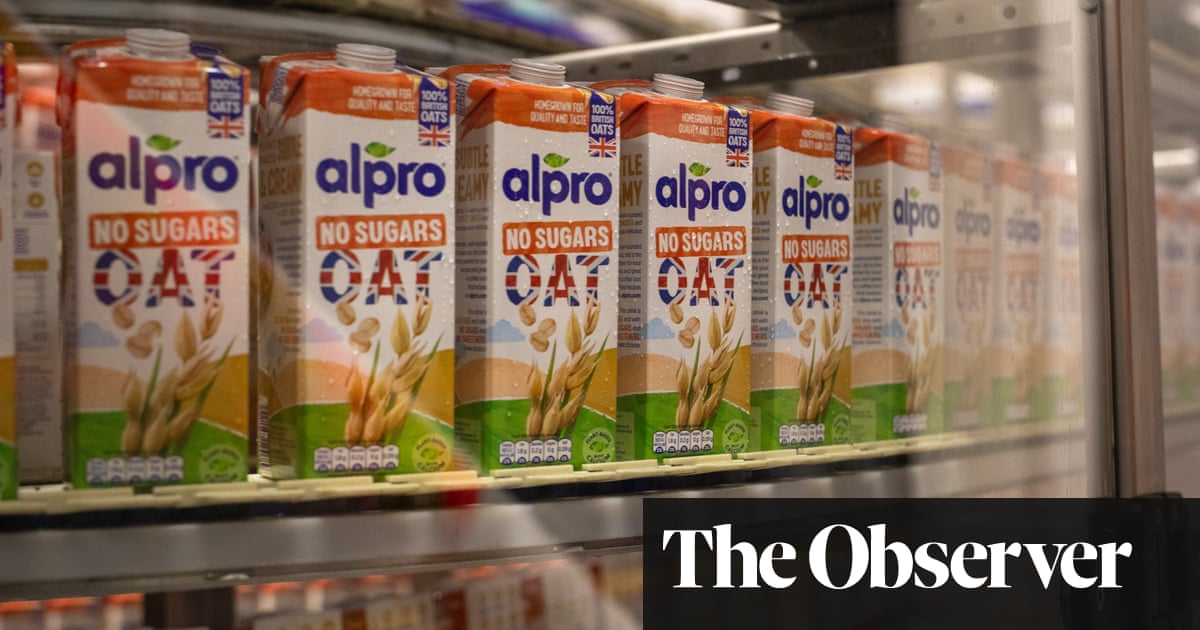With white-suited operatives tapping buttons on huge machines and its walls a tangle of heavy-duty pipes, the sprawling complex in the Northamptonshire countryside could pass for a Bond villain’s lair, were it not for the comforting porridge smell.
But rather than plotting world domination, the site’s owner, Navara Oat Milling, is piggybacking on Britons’ growing thirst for plant-based alternatives to dairy. At regular intervals, trucks loaded with up to 30 tonnes of oat flour trundle eight miles up the road to the Alpro factory in Kettering, which churns out over 200m litres of plant milk a year.
The decision by Alpro’s French owner, Danone, to switch to using British oats rather than an imported syrup in its main oat drink range is the latest in a wave of innovations as plant-based food makers write a new chapter after the boom-and-bust story of the past 10 years.
During the cost of living crisis, shoppers turned away from pricey dairy and meat alternatives. In the squeeze that followed, retailers cut shelf space for such products and some high-profile names went under. Meatless Farm, for example, ceased trading before being rescued from administration.
Now the worst appears over, for dairy alternatives anyway, not least because Britons are pairing plant milk with another expensive habit – coffee. Today, one in four coffees sold by the major chains is made with it, with oat the No 1 choice.
Supermarket sales data shows shoppers are putting more of it in their baskets for the first time since 2022. In the year to February 2025, sales volumes were up 2.1% on the previous 12-month period, and oat milk romped ahead with growth of 7.2%, according to data firm Kantar. Just under 35% of UK households consume plant-based drinks, it says.
As plant-based food brands regroup, marketers are looking for new ways to win over shoppers. The fast-growing Plenish brand is billing itself as the “UK’s only clean-label fortified m*lk with no oils and additives”, while to stand out against UHT rivals, Oato launched “fresh” oat milk last year. To make plant milks more affordable, both Alpro and Oatly have introduced cheaper 500ml packs.
With the Navara mill processing oats grown within 80 miles, Alpro’s decision to play the British card stands out in a market where the other big brands produce overseas. Last year, Oatly shelved plans for a factory in Peterborough, and to hammer the point home the Alpro carton is emblazoned with union jacks.
In more exuberant times, supermarket chiller cabinets bulged with plant milks, with incumbents such as soya, oat and almond pitted against pea, potato and all manner of nuts. But oat won out and annual sales top £275m, up from £155m five years ago. This year, oat will make up 40% of the market on a volume basis, with half a million litres sold each day in the UK.
Analysts say that oat has emerged victorious due to its superior taste and because consumers see the ingredient as recognisable and healthy.
While the hi-tech Navara mill cost over £50m, James Skidmore, managing director, says the milling process children learned about watching Windy Miller in the classic TV show Camberwick Green has hardly changed.
“How you manufacture oat flour or flakes from raw oats is fundamentally the same,” he says. However, heavy investment in automation means Navara can make adjustments to produce a consistent raw material.
To change the Alpro recipe, Danone made a multimillion-pound investment in the Kettering site, buying the machinery required to turn the flour into the “oat juice” that is the new base ingredient for its oat drinks.
After research showed that half of plant-based shoppers are driven by health, Alpro is trumpeting the fact that its new recipe is low fat, high in fibre and bolstered with vitamins and minerals. However, Tom Kerr, Danone’s head of category management and commercial planning – plant-based, says customers also just like how it tastes. “A lot of people prefer an oat flat white v a dairy flat white from a taste point of view.”
Key to the success of plant-based foods is for brands to be “really clear and consistent in the health messaging around it”, Kerr believes, pointing to lessons learned from the travails of alt-meat. “It was such an explosion, it almost became overwhelming for shoppers to understand what the benefit is. We are trying to make consistent improvements and be very clear about the health benefit.”
While bestselling brands like Oatly have gone into battle with dairy, citing oat’s lower climate impact, for consumers it is not an either-or situation. Nine out of 10 plant-milk buyers stack it beside cow’s milk. That left higher-priced dairy alternatives vulnerable during the cost of living crisis, when shoppers balked at paying for two kinds of the same product.
One solution has been smaller pack sizes: “We wanted to create options at a lower absolute price points so smaller households or single-user households can still have it,” says Danone’s Tom Kerr.
Kiti Soininen at Mintel thinks plant-based milk will be a long-term growth story, thanks to its young customer base. While only 14% of over-45s use plant-based milk, nearly twice as many under-45s drink it, Mintel’s research shows. “There’s little reason to think younger consumers will abandon their now-familiar option,” he says. “Many children are growing up with oat and nut milks in the family fridge, with a quarter of parents of under-16s using plant-based milk.”
A limiting factor is cost, as although plant milk is increasingly included in supermarket promotions, it is still more expensive than cow’s milk. But comparing a generic pint of cow’s milk with a trendy oat milk brand is not a fair comparison, says Thijs Geijer, an economist at ING Research. For a start, the UK cow’s milk market is 10 times the size of plant-based.
“You pay a premium for the brand,” says Geijer. “Brands use that to invest in things like innovation and marketing. Manufacturing is not necessarily expensive, but in producing milk, dairy companies profit from their economies of scale and sell a range of other dairy products that are more profitable than milk. Milk in supermarkets is really commoditised – high volume but low margins.”
Interestingly, while dairy alternatives are often discussed as a way to combat the climate crisis, the drink’s environmental impact is not the main reason people pick it up – perceptions that it is a “healthier choice”, suitable for allergy sufferers, and tasty score higher as reasons to buy in Mintel’s polling.
Indeed, the environmental impact of food and drink is of low importance when it comes to people’s choices, says Soininen; how it tastes and how much it costs are by far the most important things.
“The category has not escaped the recent spotlight on ultra-processed foods (UPFs), with dairy alternatives widely seen as highly processed,” she adds. “However, these views are not a major deterrent.”










